Gutter Cleaning North Vernon
Top 10 Gutter Cleaning in North Vernon
Get multiple Gutter Cleaning and Repair quotes for your project today! Compare profiles, reviews, accreditations, portfolio, etc... and choose the best offer.
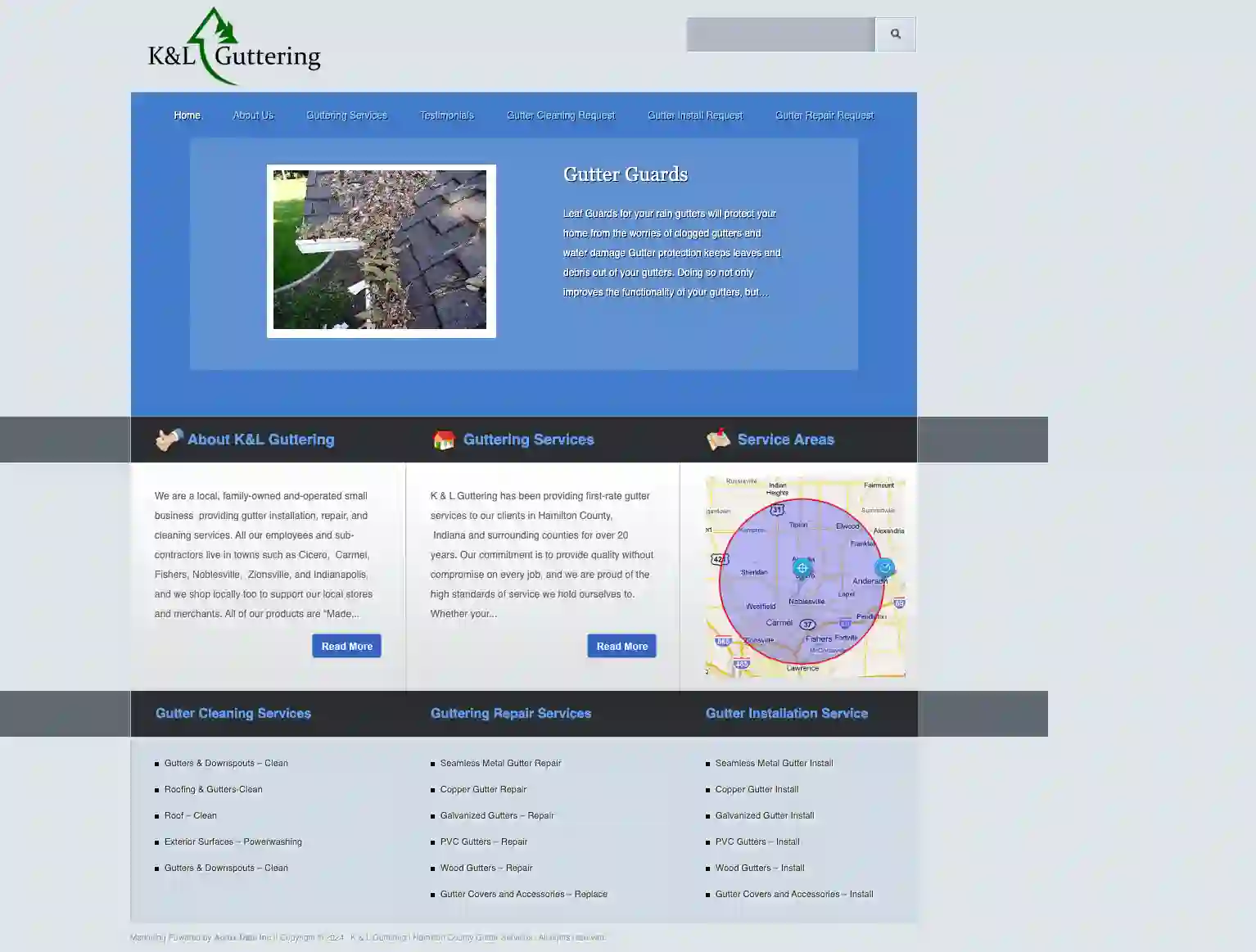
K&L Guttering
3.84 reviews1749 Nantucket Drive, Cicero, 46034, USK & L Guttering is a local, family-owned and-operated small business providing gutter installation, repair, and cleaning services. We are fully insured and professional, with all our employees and sub-contractors living in towns such as Cicero, Carmel, Fishers, Noblesville, Zionsville, and Indianapolis. We shop locally too to support our local stores and merchants. All of our products are 'Made in America,' and although we are local, K&L Guttering is also an approved gutter installer for some of America's nationally known home improvement stores.
- Services
- Why Us?
- Testimonials
- Gallery
Get Quote
RPM Exterior Services
516 reviews1111 N. Delaware St., Indianapolis, IN, 46208, USRPM Exterior Services is a small, local company that specializes in providing services to property management companies, homeowner associations, commercial, medical, and retail centers in Indianapolis and surrounding areas. Customer satisfaction is our number one priority and our team strives for perfection. Our dedication to doing an exterior service project right and to providing superior customer service has allowed us to make a lasting impact for over 1,500 customers. The exterior of your business is very important. It often times is the first impression a potential customer receives. We help you make sure that it’s a good one! We are a full-service, exterior maintenance company located right here in central Indiana. We offer anything from full grounds maintenance to snow & ice management. We also specialize in gutter cleaning and gutter guard installation. We work with many property management companies, banks, residential homes, and businesses all over the area.We work in Indianapolis, Greenwood, Whiteland, Franklin, New Palestine, and surrounding areas.
- Services
- Why Us?
- Our Team
- Testimonials
- Gallery
Get Quote
Johnson Seamless Gutters
54 reviews7569 Indiana 25, Tippecanoe, IN, USJohnson Seamless Gutters is a leading provider of top-tier seamless gutter installation & repair services in Tippecanoe, IN, and surrounding areas. We are dedicated to creating trustworthy solutions for your home or business, ensuring long-lasting protection from the elements. Our commitment to quality and affordability means we use durable materials, offer quick installation times, and provide year-round availability. We pride ourselves on our meticulous work ethic and attention to detail, ensuring your gutters are in excellent working order for years to come. Our team prioritizes your peace of mind with every job, delivering results that speak for themselves.
- Services
- Why Us?
- Accreditations
- Our Team
- Testimonials
- Gallery
Get Quote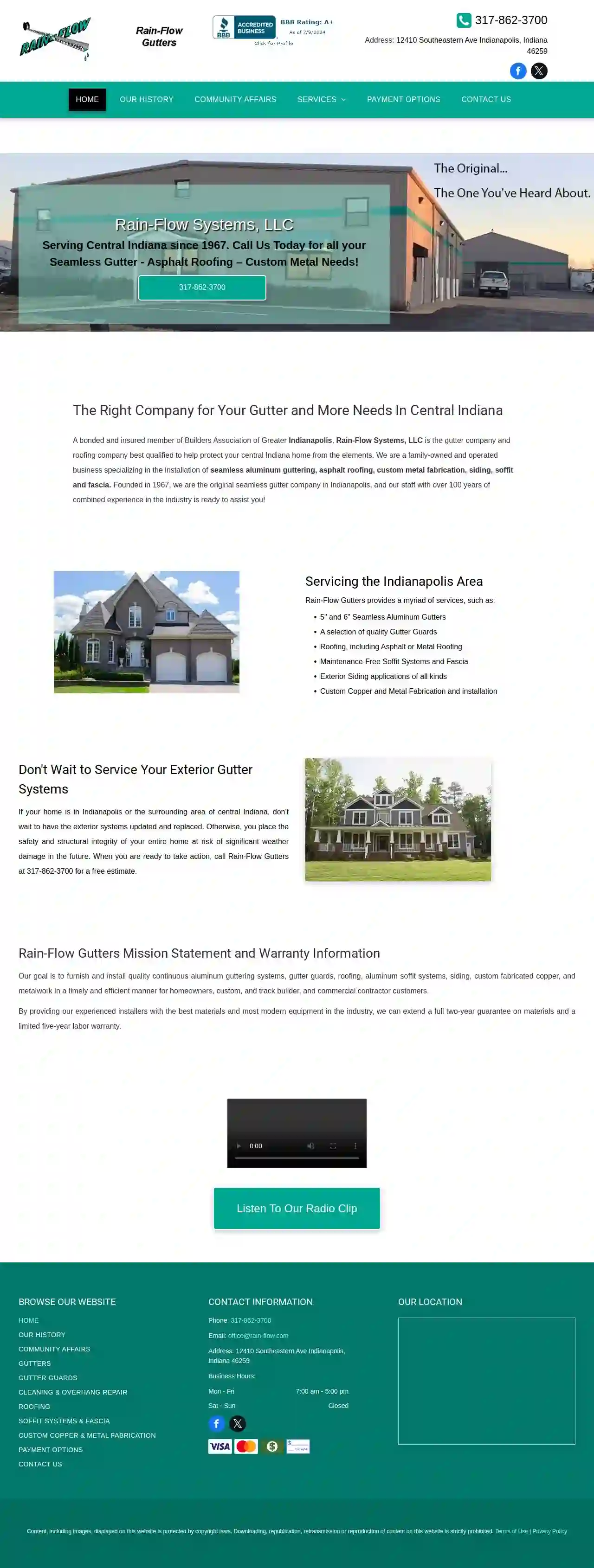
Rain Flow Gutters
4.619 reviews12410 Southeastern Ave., Indianapolis, 46259, USRain-Flow Systems, LLC has been serving Central Indiana since 1967. We are a family-owned and operated business specializing in the installation of seamless aluminum guttering, asphalt roofing, custom metal fabrication, siding, soffit and fascia. Founded in 1967, we are the original seamless gutter company in Indianapolis, and our staff with over 100 years of combined experience in the industry is ready to assist you! We are a bonded and insured member of the Builders Association of Greater Indianapolis. Our goal is to furnish and install quality continuous aluminum guttering systems, gutter guards, roofing, aluminum soffit systems, siding, custom fabricated copper, and metalwork in a timely and efficient manner for homeowners, custom, and track builder, and commercial contractor customers. By providing our experienced installers with the best materials and most modern equipment in the industry, we can extend a full two-year guarantee on materials and a limited five-year labor warranty.
- Services
- Why Us?
- Accreditations
- Gallery
Get Quote
CNC Roofing Solutions
519 reviews1101 Meridian St, Anderson, 46013-3795, USCNC Roofing Solutions is the leading local roofing company serving the Anderson, Indiana area. We specialize in providing a complete range of roofing services, from new construction to repairs and replacements, with a focus on quality, innovation, and expertise. Our team of experienced and certified professionals is dedicated to delivering exceptional workmanship and customer service. We pride ourselves on honesty, transparency, and fair pricing, ensuring our clients receive the best value for their investment. Whether you need a minor repair or a complete roof overhaul, CNC Roofing Solutions is your trusted partner for all your roofing needs.
- Services
- Why Us?
- Accreditations
- Gallery
Get Quote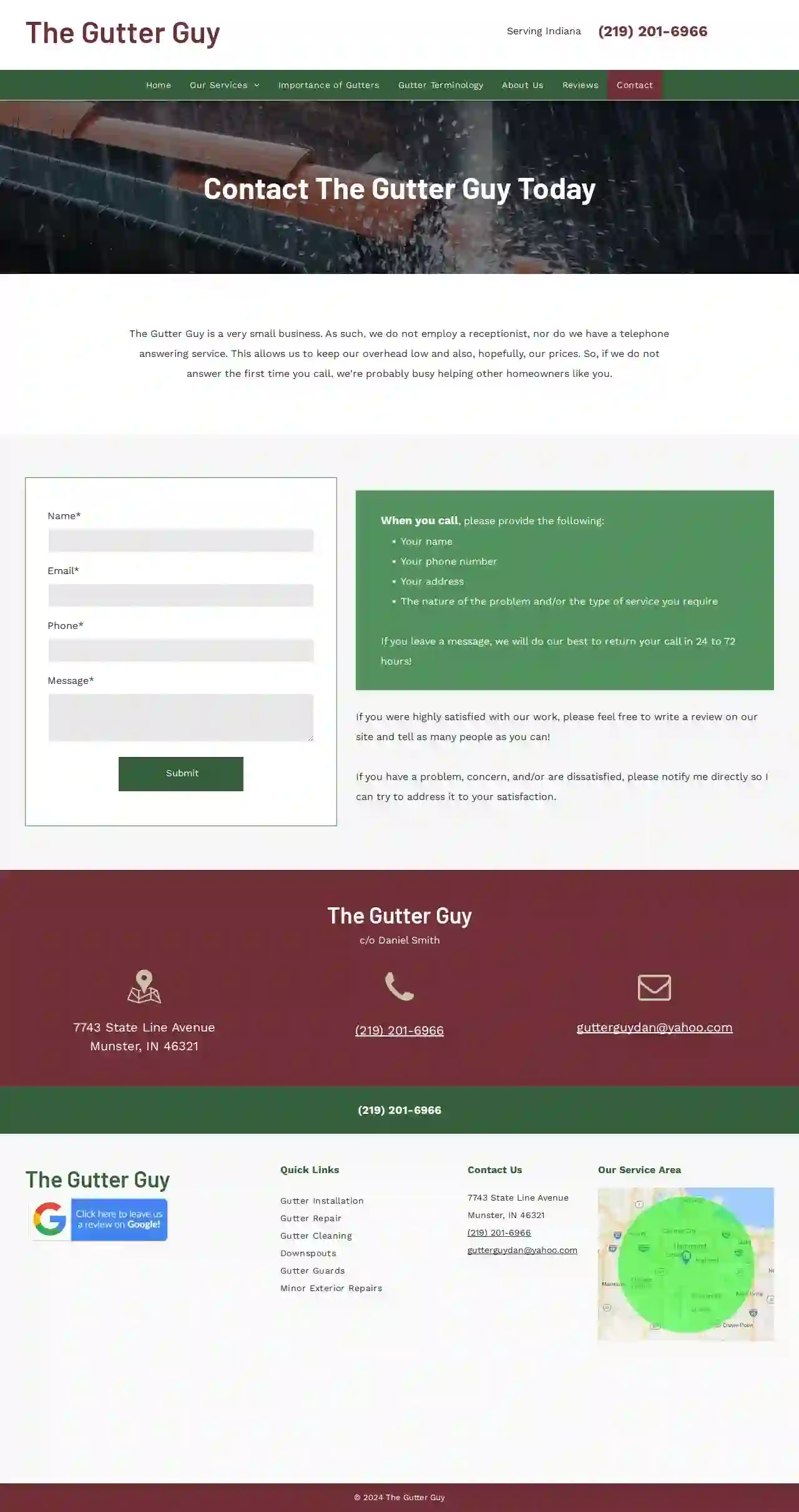
The Gutter Guy
51 reviewsMunster, IN, 7743 State Line Avenue, 46321, USThe Gutter Guy is a locally owned company serving Indiana, owned and operated by Daniel Smith of Munster, Indiana. With 40 years of experience, we provide high-quality gutter products and services that you'll value long after the initial work is complete. Our mission is to provide you with excellent craftsmanship, integrity, and reliability. We stand for providing the highest quality craftsmanship on every job we do, using only the most reliable, knowledgeable, and honest workers to assist. We guarantee nearly all the work we do, with some exceptions where we cannot guarantee the work due to the nature of the job. We are a small business, which allows us to keep our overhead low and offer competitive pricing. We are proud to serve the community and provide exceptional service to our customers.
- Services
- Why Us?
- Our Team
- Testimonials
- Gallery
Get Quote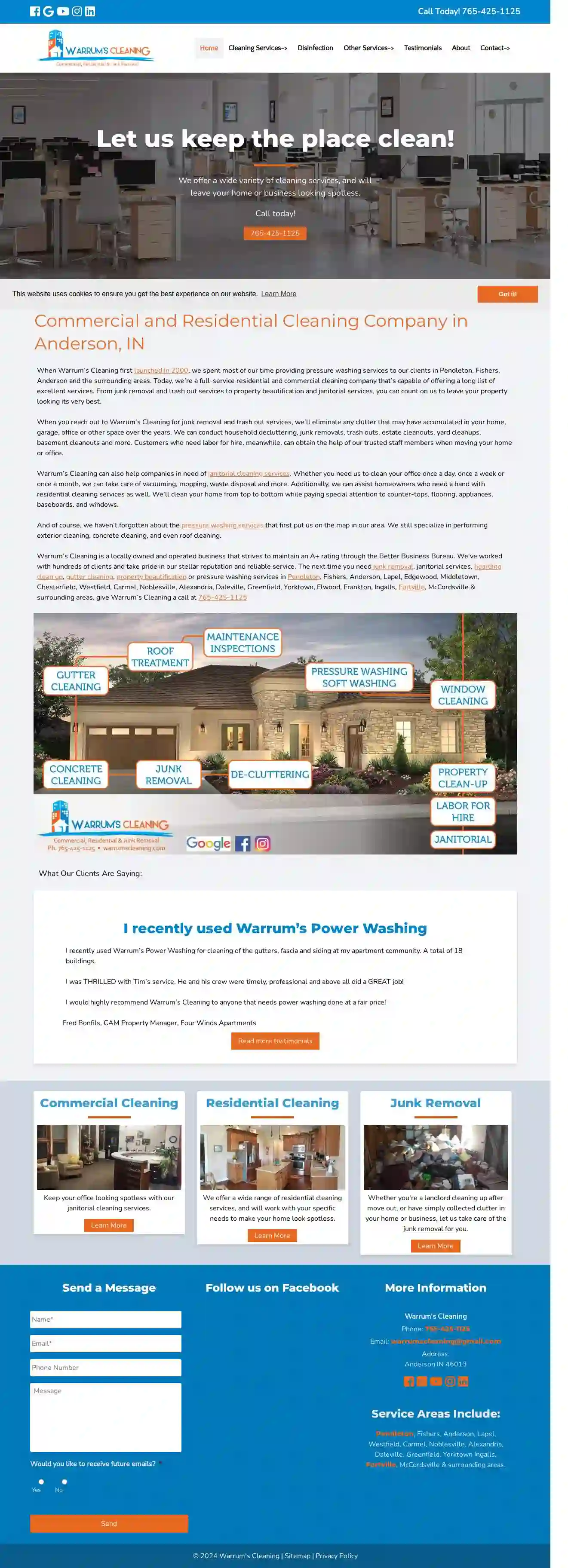
Warrum's Cleaning
529 reviewsAnderson IN, Anderson, 46013, USLet us keep the place clean! We offer a wide variety of cleaning services, and will leave your home or business looking spotless. Call today! 765-425-1125. Commercial and Residential Cleaning Company in Anderson, IN. When Warrum’s Cleaning first launched in 2000, we spent most of our time providing pressure washing services to our clients in Pendleton, Fishers, Anderson and the surrounding areas. Today, we’re a full-service residential and commercial cleaning company that’s capable of offering a long list of excellent services. From junk removal and trash out services to property beautification and janitorial services, you can count on us to leave your property looking its very best. When you reach out to Warrum’s Cleaning for junk removal and trash out services, we’ll eliminate any clutter that may have accumulated in your home, garage, office or other space over the years. We can conduct household decluttering, junk removals, trash outs, estate cleanouts, yard cleanups, basement cleanouts and more. Customers who need labor for hire, meanwhile, can obtain the help of our trusted staff members when moving your home or office. Warrum’s Cleaning can also help companies in need of janitorial cleaning services. Whether you need us to clean your office once a day, once a week or once a month, we can take care of vacuuming, mopping, waste disposal and more. Additionally, we can assist homeowners who need a hand with residential cleaning services as well. We’ll clean your home from top to bottom while paying special attention to counter-tops, flooring, appliances, baseboards, and windows. And of course, we haven’t forgotten about the pressure washing services that first put us on the map in our area. We still specialize in performing exterior cleaning, concrete cleaning, and even roof cleaning. Warrum’s Cleaning is a locally owned and operated business that strives to maintain an A+ rating through the Better Business Bureau. We’ve worked with hundreds of clients and take pride in our stellar reputation and reliable service. The next time you need junk removal, janitorial services, hoarding clean up, gutter cleaning, property beautification or pressure washing services in Pendleton, Fishers, Anderson, Lapel, Edgewood, Middletown, Chesterfield, Westfield, Carmel, Noblesville, Alexandria, Daleville, Greenfield, Yorktown, Elwood, Frankton, Ingalls, Fortville, McCordsville & surrounding areas, give Warrum’s Cleaning a call at 765-425-1125.
- Services
- Why Us?
- Accreditations
- Our Team
- Testimonials
- Gallery
Get Quote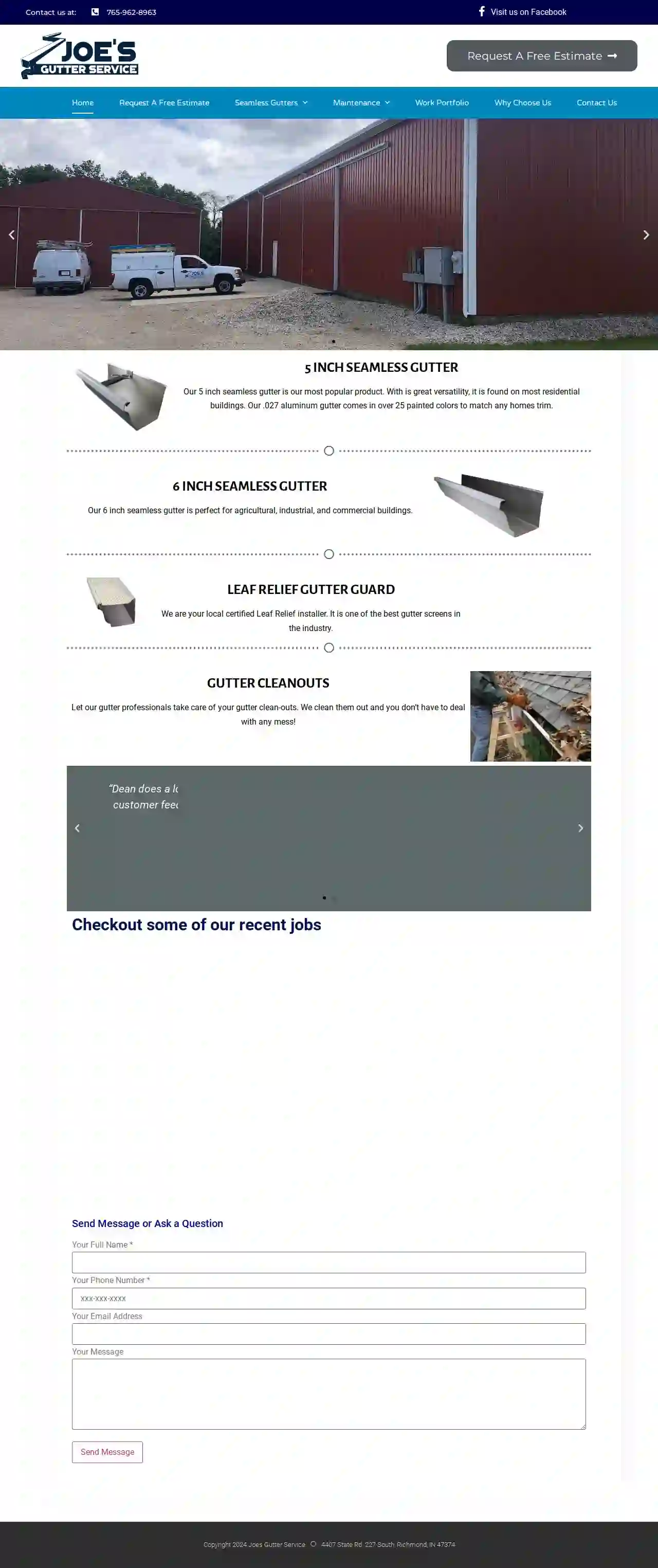
Joe's Gutter Service LLC
522 reviews4407 State Rd. 227 South, Richmond, 47374, USJoe’s Gutter was founded in 19xx by Joe.
- Services
- Why Us?
- Testimonials
- Gallery
Get Quote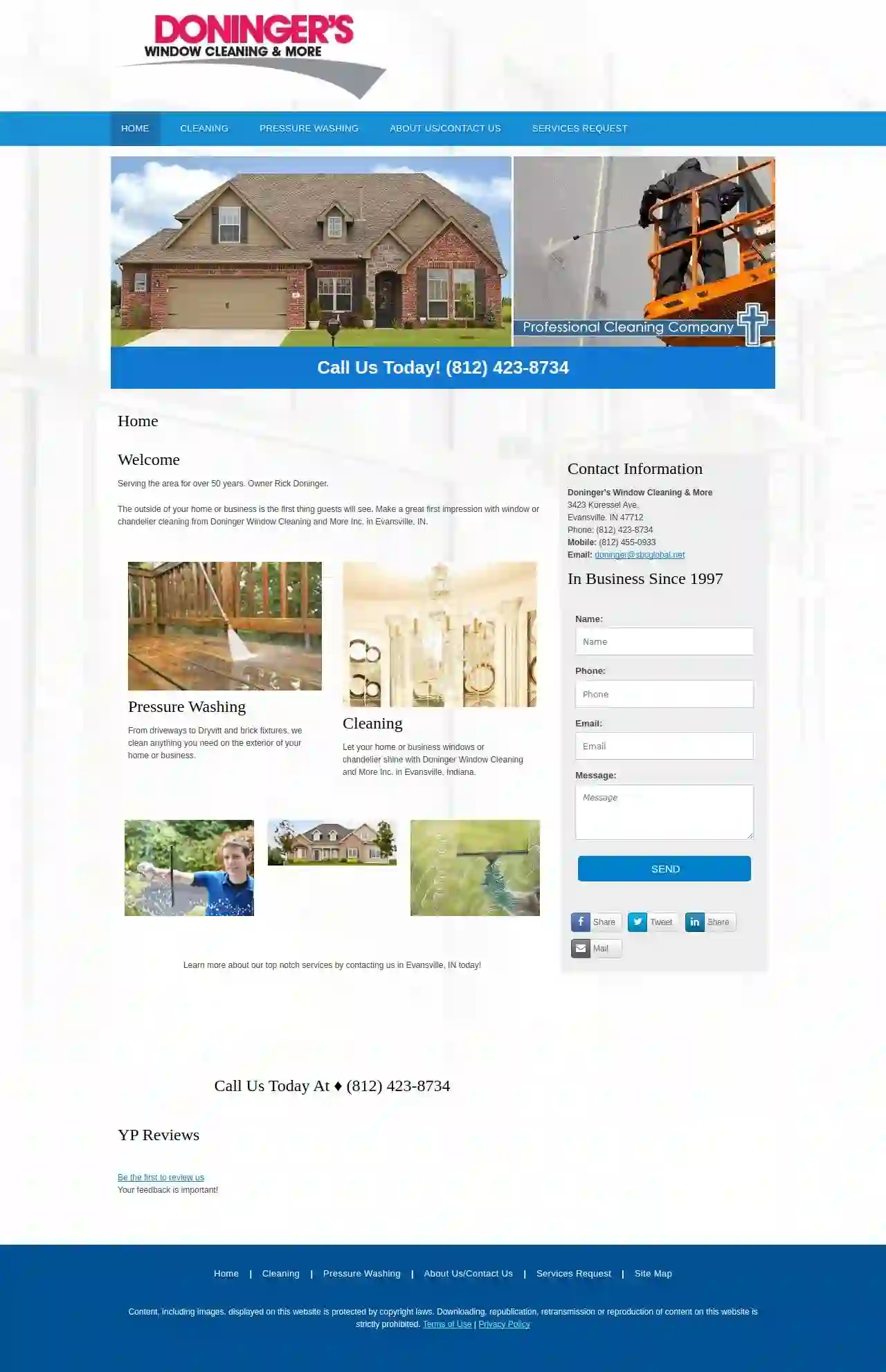
Doninger Window Cleaning & More
4.33 reviews3423 Koressel Ave., Evansville, 47712, USServing the area for over 50 years. Owner Rick Doninger. The outside of your home or business is the first thing guests will see. Make a great first impression with window or chandelier cleaning from Doninger Window Cleaning and More Inc. in Evansville, IN. Pressure Washing From driveways to Dryvitt and brick fixtures, we clean anything you need on the exterior of your home or business. Cleaning Let your home or business windows or chandelier shine with Doninger Window Cleaning and More Inc. in Evansville, Indiana.
- Services
- Why Us?
- Our Team
- Gallery
Get Quote
A Plus Home and Roof Wash
565 reviewsU.S.A., Gas City, IN, 46933, US- Services
- Why Us?
- Accreditations
- Our Team
- Testimonials
- Gallery
Get Quote
Over 60,241+ Cleaning Companies in our network
Our cleaning services operate in North Vernon and surroundings!
CleaningMatch has curated and vetted Top Janitorial Services in North Vernon. Find a trustworthy business today.
Frequently Asked Questions About Gutter Cleaning
- Improper Ladder Placement: Placing a ladder incorrectly can damage shingles or gutters.
- Excessive Force: Using excessive force when removing debris can damage gutters or dislodge shingles.
- High-Pressure Washing: Using high-pressure washing on delicate roofing materials can cause damage.
- Ladders and Safety Equipment: They use sturdy ladders and safety harnesses to access gutters safely.
- Gutter Scoops and Hand Tools: They use gutter scoops, trowels, and other hand tools to remove leaves, twigs, and debris from gutters.
- Blowers and Vacuums: They may use blowers or vacuums to remove lighter debris and leaves from gutters and downspouts.
- Pressure Washing: Some gutter cleaners use pressure washers to flush out stubborn debris and clean the gutters thoroughly.
- Debris Disposal: They bag and dispose of the collected debris properly.
- Reduced Leaks: Seamless gutters have fewer seams, reducing the likelihood of leaks developing over time.
- Improved Appearance: Seamless gutters create a more aesthetically pleasing and streamlined look along your roofline.
- Less Maintenance: Fewer seams mean less opportunity for debris to accumulate, reducing the frequency of cleaning needed.
- Aluminum: A popular choice due to its affordability, durability, and resistance to rust. Available in seamless and sectional varieties.
- Vinyl: Lightweight, inexpensive, and easy to install. Less durable than aluminum and can become brittle in extreme temperatures.
- Steel: Strong and durable but prone to rust if not galvanized or coated.
- Copper: High-end and aesthetically pleasing, known for its longevity and resistance to corrosion. More expensive than other gutter materials.
- Zinc: Durable and long-lasting, with a distinctive patina that develops over time. More expensive than aluminum but less expensive than copper.
Can gutter cleaning damage my roof?
To minimize the risk of roof damage, choose a reputable gutter cleaning company with experienced and trained professionals who prioritize safety and use appropriate cleaning methods.
How do professional gutter cleaners clean gutters?
Professional gutter cleaners have the experience, equipment, and knowledge to ensure thorough and safe gutter cleaning.
What are seamless gutters, and are they better than sectional gutters?
Advantages of Seamless Gutters:
While seamless gutters offer advantages, sectional gutters are typically more affordable and easier to repair if a section becomes damaged. The best choice for your home depends on your budget, aesthetic preferences, and the length and complexity of your roofline.
What are the different types of gutter materials?
The best gutter material for your home depends on your budget, climate, and aesthetic preferences. Consult with a gutter professional to determine the most suitable option for your needs.
Can gutter cleaning damage my roof?
- Improper Ladder Placement: Placing a ladder incorrectly can damage shingles or gutters.
- Excessive Force: Using excessive force when removing debris can damage gutters or dislodge shingles.
- High-Pressure Washing: Using high-pressure washing on delicate roofing materials can cause damage.
To minimize the risk of roof damage, choose a reputable gutter cleaning company with experienced and trained professionals who prioritize safety and use appropriate cleaning methods.
How do professional gutter cleaners clean gutters?
- Ladders and Safety Equipment: They use sturdy ladders and safety harnesses to access gutters safely.
- Gutter Scoops and Hand Tools: They use gutter scoops, trowels, and other hand tools to remove leaves, twigs, and debris from gutters.
- Blowers and Vacuums: They may use blowers or vacuums to remove lighter debris and leaves from gutters and downspouts.
- Pressure Washing: Some gutter cleaners use pressure washers to flush out stubborn debris and clean the gutters thoroughly.
- Debris Disposal: They bag and dispose of the collected debris properly.
Professional gutter cleaners have the experience, equipment, and knowledge to ensure thorough and safe gutter cleaning.
What are seamless gutters, and are they better than sectional gutters?
Advantages of Seamless Gutters:
- Reduced Leaks: Seamless gutters have fewer seams, reducing the likelihood of leaks developing over time.
- Improved Appearance: Seamless gutters create a more aesthetically pleasing and streamlined look along your roofline.
- Less Maintenance: Fewer seams mean less opportunity for debris to accumulate, reducing the frequency of cleaning needed.
While seamless gutters offer advantages, sectional gutters are typically more affordable and easier to repair if a section becomes damaged. The best choice for your home depends on your budget, aesthetic preferences, and the length and complexity of your roofline.
What are the different types of gutter materials?
- Aluminum: A popular choice due to its affordability, durability, and resistance to rust. Available in seamless and sectional varieties.
- Vinyl: Lightweight, inexpensive, and easy to install. Less durable than aluminum and can become brittle in extreme temperatures.
- Steel: Strong and durable but prone to rust if not galvanized or coated.
- Copper: High-end and aesthetically pleasing, known for its longevity and resistance to corrosion. More expensive than other gutter materials.
- Zinc: Durable and long-lasting, with a distinctive patina that develops over time. More expensive than aluminum but less expensive than copper.
The best gutter material for your home depends on your budget, climate, and aesthetic preferences. Consult with a gutter professional to determine the most suitable option for your needs.